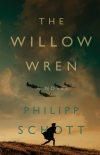The Willow Wren by Philipp Schott (electronic book reader TXT) 📗

- Author: Philipp Schott
Book online «The Willow Wren by Philipp Schott (electronic book reader TXT) 📗». Author Philipp Schott
Chapter Fifty-Four
April 3 & 4, 1949
It was then a simple matter to follow the train tracks and in a short while we were in the Vienenburg train station. There we spent a cold night in the waiting room with a number of other refugees who had trickled in by various routes at various times. A West German police officer came by in the early morning and asked for our papers and our destination. There was no fear that we would be sent back, but there was the strong possibility of being forced to stay in a refugee camp if we could not name a specific address that we were going to. The West did not want thousands of refugees roaming the countryside. Mama gave him Papa’s address in Worpswede. The officer was satisfied with this but said that we would still have to go to the Red Cross refugee processing centre in Uelzen, three hours north by train, and prove to them that this address was legitimate. We were given a temporary travel permit for this. Before getting on the train, Mama arranged to have a telegram sent to Papa to tell him that we had decided to leave Colditz, had made it successfully across the border and were going to be in the Uelzen Red Cross camp tonight. Mama and I exchanged glances as this telegraph was prepared, but neither of us said anything.
In Uelzen we were welcomed with a big bowl of beet soup. We had had a little bit of bread in the Vienenburg train station, but this was the first real hot food I had seen in days. I swear that I will remember that soup until I die. The camp was enormous with more barracks than I could count and about thirty families per barrack. It was noisy during the night and mice or rats scurried about beneath our beds, but none of us cared. I would have slept through an aerial bombardment. Before I drifted off I thought of all the other families bedded down around me. I saw that one child was missing an arm. I heard another child speak of his dead parents. My childhood often felt extraordinary to me, but I reflected that it was, for the times, an ordinary German childhood. Not the best, but not the worst. Somewhere in the middle.
The next morning a British officer sought us out, carrying a clipboard that had our barrack and bunk numbers recorded on it.
“Luise Schott?”
“Yes.”
“And five children, Ludwig, Clara, Johann, Oskar and Paul?”
“Yes.”
“From Colditz, Saxony?”
“Yes.”
The officer smiled warmly. “A Wilhelm Schott is here for you. He says he is here to take you home.”
I looked around at the faces of my family. Clara and Johann looked excited, while Oskar and Paul looked confused. Mama’s expression was unreadable but then she caught my eye and smiled at me. It was a small thin smile that somehow conveyed both relief and resolve. I knew what she meant.
Epilogue
I, Philipp, will take over the narrative now, as in the end it was me who listened to all of their stories and then picked up the separate threads and wove them together to write this book.
Ludwig did not become a forest ranger, although he still dreamed of it while living in very cramped and difficult circumstances in Worpswede. It did not feel like home. He ultimately received the highest high school graduation marks in his state but had to work in the Bergolin paint factory and complete a commercial apprenticeship at AEG (a big electrical equipment manufacturer) before being able to go to university. He went to the University of Kiel to study plasma physics, which, while not his dream, fascinated him with its esoteric worldview and abstract mathematics. There he met a young woman named Ilse Jahnke who worked as a technician in his lab. She was from a small town north of Bremen. They married in 1963. I was born two years later, and the year after that we sailed from Bremerhaven on the Arkadia, bound for Canada. A big adventure for a young family. My father had been offered a faculty position at the University of Saskatchewan in Saskatoon. The stated plan was to stay for two years, but I know that in his heart he had no intention of ever living in Germany again. He never felt truly at home in West Germany. He said that he always felt like a refugee, like an outsider. And above all he wanted to own land somewhere where there was space and safety and solitude. Within a few years they bought an acreage outside of Saskatoon and he began planting trees, ultimately hundreds or even thousands of them, and sowing what seemed to me like acres of potatoes. He also built birdhouses by the score, mostly for bluebirds but also for owls and wrens.
Before we moved permanently to the acreage from the city my parents built a little one-room cabin in an aspen grove on a hill. My father loved to spend hours there by himself, enjoying being alone with the birds and the trees, proud of being self-sufficient, proud of living simply. The generation of Germans who grew up reading Winnetou was the same generation who had seen their country commit heinous crimes and then be destroyed in an apocalyptic war. There is a reason why you can fly directly to





Comments (0)